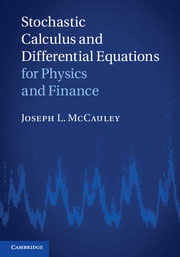McCauley’s Book Described as Innovative Contribution to Field of Mathematical Finance Theory

Order Book from Cambridge University Press Reviews describe the new book, Stochastic Calculus and Differential Equations for Physics and Finance, as filling the gap in current literature by “providing a clear and readable introduction” to the topic. Authored by the University of Houston’s Joseph L. McCauley, the book is available from Cambridge University Press.
McCauley, a professor emeritus in the UH Department of Physics, explains that the book got its start from lecture notes he prepared in 2006 for a week-long set of lectures to the economics graduate students at the University of Pisa in Italy. He will return to Pisa for three days of lectures in October. During his career, McCauley has contributed to several fields, including statistical physics, econophysics, economics and finance theory, superfluids, nonlinear dynamics, and cosmology.
Reviews of the Book
McCauley’s style of presenting the material is heralded for its clarity and as a “well crafted, yet deep and rigorous book.” Read all four reviews.
Book Summary on Cambridge University Press
Stochastic calculus provides a powerful description of a specific class of stochastic processes in physics and finance. However, many econophysicists struggle to understand it. This book presents the subject simply and systematically, giving graduate students and practitioners a better understanding and enabling them to apply the methods in practice. The book develops Ito calculus and Fokker–Planck equations as parallel approaches to stochastic processes, using those methods in a unified way. The focus is on nonstationary processes, and statistical ensembles are emphasized in time series analysis. Stochastic calculus is developed using general martingales. Scaling and fat tails are presented via diffusive models. Fractional Brownian motion is thoroughly analyzed and contrasted with Ito processes. The Chapman-Kolmogorov and Fokker-Planck equations are shown in theory and by example to be more general than a Markov process. The book also presents new ideas in financial economics and a critical survey of econometrics.
Features of the book:
- Ito calculus is formulated in terms of martingales, which are used to formulate and solve both partial differential equations and first passage time problems
- Derives Fokker-Planck and Chapman-Kolmogorov equations generally, not restricted to Markov processes
- Includes exercises at the end of each chapter
- Kathy Major, College of Natural Sciences and Mathematics